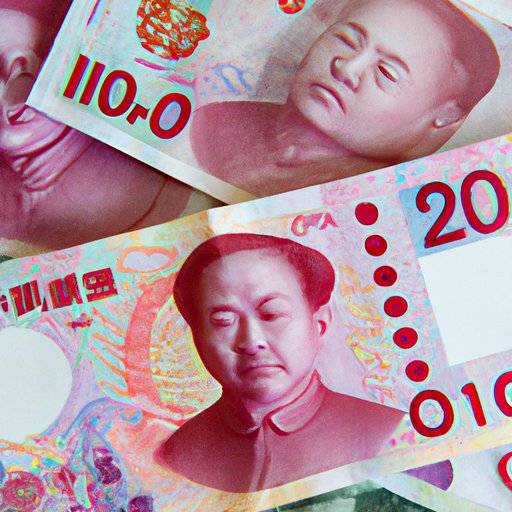Introduction
Visiting a new country can be an exciting adventure, but it can also be a bit overwhelming, especially when it comes to handling money matters. For those traveling to China, it’s important to understand the country’s monetary system, currency exchange, and payment methods in order to make the most of their trip. In this article, we’ll explore the ins and outs of money matters in China, providing tips, insights, and practical advice along the way.
Currency in China: Understanding the Yuan and Other Forms of Money
Understanding currency is key to navigating money matters in any country, and China is no exception. While China has a variety of different forms of money, the most commonly-used currency is the yuan, also known as the renminbi (RMB).
Other forms of money in China include the jiao and the fen, which are smaller denominations of the yuan. The jiao is worth one-tenth of a yuan, and the fen is worth one-hundredth of a yuan. These smaller denominations are often used for transactions involving small amounts of money, like buying fruit from a street vendor or tipping a taxi driver.
The Renminbi: A Beginner’s Guide to China’s National Currency
The yuan/renminbi (CNY/RMB) is the official currency of the People’s Republic of China, and has been in use since 1949. It’s managed by the People’s Bank of China, which is the country’s central bank.
In order to avoid confusion, it’s worth noting that the yuan and renminbi are often used interchangeably, but technically they refer to two different things. The renminbi (RMB) is the official name of the currency, while the yuan refers to the basic unit of the renminbi.
There are two different markets for the renminbi: the onshore market and the offshore market. The onshore market is where the the Renminbi is primarily used within China, whereas the offshore market is mainly used outside of China and is primarily for investors and financial institutions.
The exchange rate for the yuan against other major currencies can fluctuate, but it’s often maintained within a certain range by the Chinese government. As of August 2021, the exchange rate was approximately 6.5 RMB to 1 USD.
Exploring the Chinese Monetary System: From Cash to Digital Payments
While cash is still widely-used in China, there has been a dramatic shift towards digital payments in recent years. This shift is in part due to the wide-spread use of smartphones and mobile payment apps like Alipay and WeChat Pay, which allow people to pay for goods and services using their phones through scanning QR codes.
There are some differences in payment methods between urban and rural areas of China. While digital payments are increasingly popular in the cities, cash is still often the preferred method of payment in rural areas.
Money Matters in China: How to Handle Currency Exchange and Transactions
If you’re traveling to China from another country, you’ll likely need to exchange your home currency for yuan. The easiest way to do this is at a bank or currency exchange booth.
It’s important to note that there are some regulations and restrictions on currency exchange in China. For example, there are restrictions on the amount of foreign currency that can be brought into the country, and foreigners may encounter some difficulty trying to exchange certain currencies, like the Indian rupee.
When handling transactions in China, it’s a good idea to use cash or a prepaid card for small purchases. Credit cards are not as widely accepted in China as they are in some other countries.
China’s Financial Landscape: An Overview of Banking, Investment, and Money Management
China’s banking system is dominated by four state-owned banks known as the “Big Four”. In addition to these banks, there are also many smaller private and foreign-owned banks operating in China.
Investment opportunities for foreigners in China can be limited, but there are some options available. These include investing in Chinese stocks or bonds, or participating in private equity or venture capital opportunities.
Managing money in China can be done through various means, such as opening a local bank account or using a financial advisor. If you plan to stay in China for an extended period of time, opening a bank account is a good idea. This will allow you to access ATM machines and make digital payments more easily.
The Role of the Yuan in International Trade and Global Economics
As one of the world’s largest economies, China plays an important role in international trade, and the yuan is becoming an increasingly important currency in global economics. The yuan has been used to settle payments between China and other countries, and China has been working to make the yuan a more widely-accepted global currency.
There are still some challenges facing the yuan, however. For example, the Chinese government exercises a fair amount of control over the currency, which can make investors hesitant to invest in it.
From Ancient Coins to Modern Banking: A Brief History of Money in China
China has a long and fascinating monetary history that dates back thousands of years. One of the earliest forms of Chinese currency was cowrie shells, which were used as money during the Shang dynasty (1600-1046 BC).
The world’s first paper money was invented in China during the Tang dynasty (618-907 AD), and this paper money eventually became the dominant form of currency in China. The yuan was established as China’s national currency in 1949, and remains the primary currency used in the country today.
Conclusion
Understanding money matters in China is an important part of making the most of your trip. From understanding the different forms of currency to knowing how to handle transactions and exchange rates, there’s a lot to consider. By following these tips and insights, you’ll be better prepared to navigate the Chinese monetary system and enjoy everything this amazing country has to offer.
